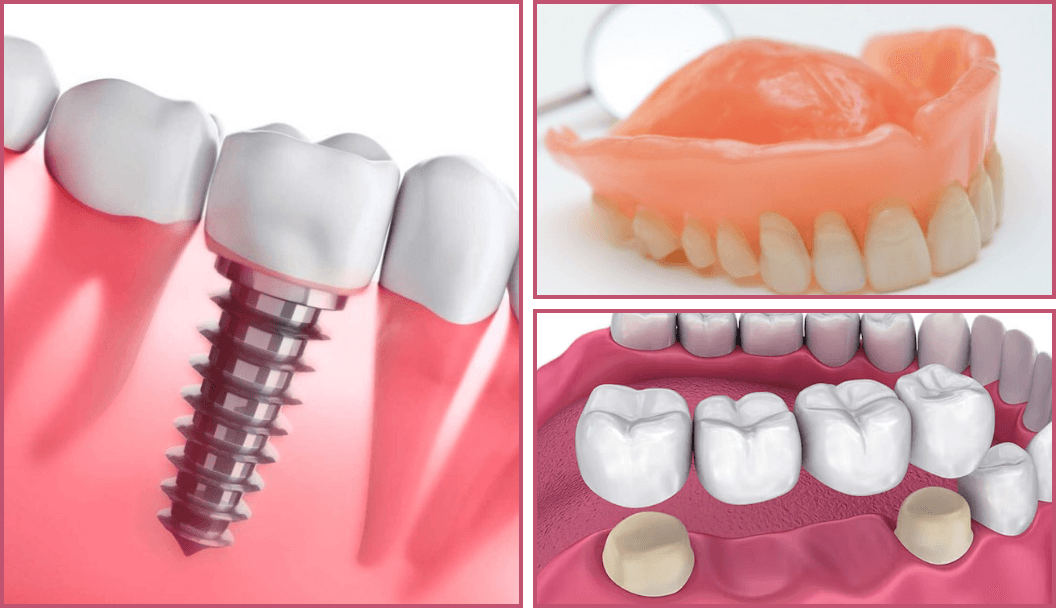
Choosing Your Tooth Replacement: Dentures vs. Implants vs. Bridges
Missing teeth can have a significant impact on your quality of life. They can compromise your smile’s appearance, hinder your ability to enjoy favorite foods, and affect speech clarity. Fortunately, modern dentistry offers various tooth replacement solutions to address these challenges. This comprehensive guide explores the world of Dentures vs. Implants vs. Bridges, empowering you to make informed choices about restoring your smile.
Choosing Your Tooth Replacement
Tooth Replacement Choices
Dentures: Removable, budget-friendly option.
Implants: The most natural-looking, long-lasting solution.
Bridges: Fixed replacement, good if you have healthy support teeth.
Factors to Consider
Cost: Varies from dentures (lowest) to implants (highest).
Procedure: Implants require surgery.
Lifestyle: Removable (dentures) vs. fixed (implants, bridges).
Why It Matters
Improves chewing and speech.
Boosts confidence and prevents facial changes.
Your Best Fit
Consult your dentist for a personalized plan!
Understanding Your Tooth Replacement Options: Dentures vs. Implants vs. Bridges
Let’s delve deeper into the specifics of each tooth replacement option:
Dentures:
Removable oral appliances that replace missing teeth and surrounding gum tissue.
Complete Dentures: Replace an entire arch of missing teeth in the upper or lower jaw.
Partial Dentures: Replace a few missing teeth while anchoring to remaining healthy teeth for support.
Immediate Dentures: Temporary dentures placed directly after tooth extraction, allowing you to have teeth while your gums heal.
Implant-Supported Dentures: Specialized dentures that snap onto or are fixed to dental implants for enhanced stability and security.
If you’re considering dentures, the team at City Dental Clinic Surrey can provide a thorough consultation and discuss your options. Learn more here: Dentures Surrey
Dental Implants:
Widely considered the gold standard in tooth replacement. Implants involve surgically placing titanium posts into the jawbone, where they fuse with the bone to act as artificial tooth roots. A dental crown, bridge, or denture can then be attached to the implant(s). Find more information about this process in Dental Implants Surrey
Dental Bridges:
Fixed appliances that bridge the gap created by one or more missing teeth.
Traditional Bridges: The most common type, utilizing crowns placed on the healthy teeth on either side of the gap to support the replacement tooth.
Cantilever Bridges: Used when there are supporting teeth on only one side of the gap.
Maryland Bridges: A conservative alternative that bonds a porcelain or metal replacement tooth to the back of supporting teeth with less reshaping.
Learn more about dental bridges here with Dental Bridges Surrey
Dentures vs. Implants vs. Bridges: Weighing the Pros and Cons Dentures
Pros
Most affordable tooth replacement option.
Non-invasive procedure, ideal for patients who may not be suitable for implant surgery.
Improve appearance and restore some chewing ability.
With implant support, offer improved stability compared to traditional dentures.
Cons
Can take time to adjust to for optimal fit and comfort.
May slip or move, particularly lower dentures, affecting speech and eating.
Require daily removal and specialized cleaning.
Don’t prevent bone loss, potentially leading to facial structure changes over time.
Dental Implants
Pros
The most natural-looking and feeling replacement, mimicking the function of natural teeth.
Long-lasting, often a lifetime solution with proper care and good oral hygiene.
Prevent bone loss and maintain facial structure, promoting a more youthful appearance.
Offer the ability to eat all foods without restrictions and speak clearly.
Cons
Most expensive tooth replacement option.
Require surgical placement and a multi-stage treatment process with healing periods.
May not be suitable for patients with insufficient jawbone density or certain medical conditions.
Dental Bridges
Pros
Fixed, non-removable solution for a natural feel.
Restore chewing function and smile aesthetics.
Generally less expensive than implants.
Quicker treatment time compared to implants.
Cons
Requires reshaping of healthy neighboring teeth, potentially compromising their long-term health.
More difficult to clean underneath, increasing the risk of decay in supporting teeth.
May need replacement over time due to wear or changes in the supporting teeth.
Deciding Factors: Dentures vs. Implants vs. Bridges
Choosing the best tooth replacement is a personal decision. Consider these key factors:
Number and Location of Missing Teeth: Implants can replace single or multiple teeth, while bridges are suitable for smaller gaps, and dentures can replace entire arches.
Oral Health: Sufficient jawbone density is crucial for implants. Bridges require healthy supporting teeth.
Budget: Dentures are the most budget-friendly, implants the most expensive, with bridges falling in between.
Lifestyle Preferences: Consider whether you prefer a removable (dentures) or fixed solution (implants, bridges).
Overall Health: Certain medical conditions or medications may impact eligibility for dental implants.
Long-Term Expectations: Implants offer the most durable and natural-looking results, while dentures and bridges may need adjustments or replacements over time.
Beyond the Basics: Additional Considerations about Dentures vs. Implants vs. Bridges
Aesthetics: Dental implants and bridges typically offer the most natural-looking results due to materials like porcelain that closely resemble natural teeth. Modern dentures have improved aesthetics as well, but sometimes subtle differences may be noticeable.
Maintenance and Care:
Dentures require daily cleaning and soaking in specialized solutions.
Implants demand the same brushing and flossing as natural teeth, with regular dental checkups.
Bridges require meticulous cleaning around and under the replacement tooth to prevent decay in supporting teeth.
Comfort: Well-fitting dentures can be comfortable. However, some people experience gum irritation or sores initially. Implants, once fully integrated, feel the most like natural teeth. Bridges can sometimes feel a bit bulky initially as you get accustomed to them.
Diet: Dentures may limit your ability to eat hard or sticky foods, especially during the adjustment period. Implants allow you to enjoy your favorite foods without restrictions. Bridges also restore normal chewing function.
Speech: Both dentures and bridges may temporarily affect speech as you adjust to the appliance in your mouth. With practice, clear speech returns. Implants don’t generally impact speech.
Jawbone Health: Tooth loss triggers bone resorption. Only dental implants stimulate the jawbone like natural tooth roots, preventing bone loss and maintaining a more youthful facial structure.
Combination Solutions
In some cases, a combination of tooth replacement options may be the best solution. For example:
Implant-Supported Dentures: Offer the stability and security of implants with the affordability of a denture.
Bridge Supported by Implants: Ideal when there isn’t adequate natural tooth structure to support a traditional bridge.
It’s Not Just About Teeth
Tooth loss extends beyond the smile itself. Here’s why replacing missing teeth is so crucial:
Improved Nutrition: Regain the ability to properly chew a variety of healthy foods.
Clearer Speech: Missing teeth can lead to difficulties with pronunciation.
Boosted Confidence: Smile without hesitation and feel good about your appearance.
Preserved Facial Structure: Prevent the sunken facial appearance associated with long-term tooth loss.
The Importance of Timely Replacement
Don’t delay replacing missing teeth. Aside from the aesthetic and functional problems, consequences of prolonged tooth loss include:
Shifting Teeth: Adjacent teeth may drift into gaps, affecting your bite
Increased Decay Risk: Gaps trap food, and altered bite patterns can make cleaning difficult.
Difficulty with Future Replacements: Bone loss hinders future options like implants.
The Bottom Line about Dentures vs. Implants vs. Bridges: There’s No One-Size-Fits-All Answer
Finding the perfect tooth replacement is a personal journey. Your needs, budget, lifestyle preferences, and overall health all play a significant role. This guide serves as a starting point, equipping you with knowledge for a productive conversation with your dentist. Think of them as your expert partner in this decision. Together, you’ll explore the advantages and considerations of each option, ultimately tailoring a treatment plan that restores both your smile and your quality of life!
Missing teeth can impact your smile, confidence, and overall health. Fortunately, there are solutions! Dentures, implants, and bridges are all effective ways to restore your smile. For extra information on these options, check out the American Dental Association’s (ADA) “Mouth Healthy” website.
Your Dentist – The Key to a Confident Smile
Your dentist is your best ally in exploring “Dentures vs. Implants vs. Bridges.” They will conduct a thorough evaluation, discuss your goals, and create a personalized treatment plan.
Don’t hesitate to ask questions! Understanding your options empowers confident decision-making.
Remember: Restoring your smile is an investment in your health, well-being, and quality of life. Choose the solution that best aligns with your needs and smile confidently again!


